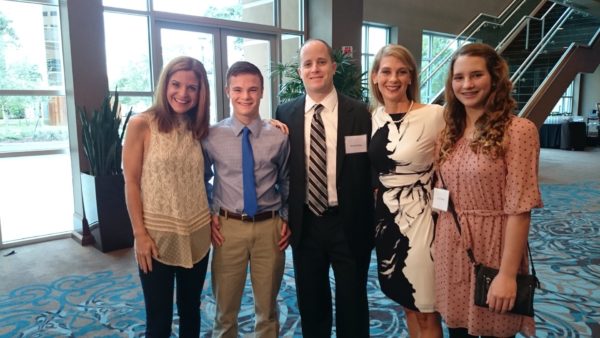 Many people have strong reactions to and opinions about being told, “everything happens for a reason.” I recently read an article that equated these words to “nothing less than emotional, spiritual and psychological violence.”
Many people have strong reactions to and opinions about being told, “everything happens for a reason.” I recently read an article that equated these words to “nothing less than emotional, spiritual and psychological violence.”
I know while my son was clinging to life in the NICU I would not have wanted anyone to tell me his early birth held deeper philosophical meaning that would make me a better person. But I also can’t deny the fact that 16 years later, my life has been transformed in ways I could never of imagined.
If I had the ability to choose whether or not my son would have a NICU stay, I would certainly never choose to relive those four grueling months, knowing how much he suffered and how much he has struggled physically and developmentally through the years. Yet, with the support of my husband, family, community and amazing therapists, I was able to grow from the experience. I found out I was so much stronger than I ever believed. My life is so much more meaningful, parenting and marriage are so much sweeter, my friendships deeper and my faith stronger than before I knew what the acronym NICU stood for. And there is no question my son is a more empathetic person who knows his life has meaning and purpose because of what he went through.
Posttraumatic growth is often reported by cancer survivors, trauma victims, HIV-infected individuals and those with spinal cord injuries. Recent investigations have shown that posttraumatic growth also occurs for children and families after the serious illness of a child. And while it has not been widely reported in medical literature, we know posttraumatic growth is possible for NICU graduate parents as well. It should be noted this posttraumatic growth does not typically happen for many years, and is often impacted by socioeconomic status, the nature and permanence of the health condition, the parent’s psychological state and the family’s support systems.
A recent article written by healthcare providers who had personal NICU experiences with their children and grandchildren highlights the positive family transformations that often occur after a NICU stay. But the authors are careful to note they chose to reflect on the positive changes in their lives as transformations rather than posttraumatic growth. Rather than grow, they felt they were stronger, yet more vulnerable after going through the experience of prematurity, babies born with devastating diagnosis and loss.
Some of the life lessons shared in the article include gratitude for the gift of life, forgiveness, learning not to sweat the small stuff, respecting the fact that some things are simply out of our control, humility and resilience.
But before we can even think about what positive things may result from our difficult and traumatic birth experience we must first grieve what we have lost.
Through his gritty, uncensored, and take no prisoners writing, writer Tim Lawrence helps people navigate life’s difficulties – grief, injury, depression, or loss – and learn to forge strength in the fire. Tim cautions us that our culture has treated grief as a problem to be solved, an illness to be healed or both. He argues that in the process we’ve done everything we can to avoid, ignore or transform grief. As a result we are surrounded by platitudes rather than by people when we face tragedy. He reminds us that while devastation can lead to growth, it often doesn’t. And it doesn’t precisely because we have replaced grieving with advice. With platitudes. With our absence. He reminds us that some things in life cannot be fixed; they can only be carried. And they should not be carried alone.
In her new book, Love Warrior, New York Times bestselling author and former Hand to Hold Baby Shower luncheon speaker, Glennon Doyle Melton writes about our culture’s desire to avoid pain and the devastation and loneness that ensues because we try to fix each other’s pain rather than experience it together.
“What we need are patient, loving witnesses. People to sit quietly and hold space for us. People to stand in helpless vigil to our pain.” — Glennon Doyle Melton, Love Warrior
 Learning from her own painful experiences what is needed during and following trauma, she promises her loved ones she will show up and stand humble in the face of their pain. “I won’t let my discomfort with her pain keep me from witnessing it for her. I’ll never try to grab or fix her pain, because I know that for as long as it takes, her pain will also be her comfort. It will be all she has left. Grief is love’s souvenir.”
Learning from her own painful experiences what is needed during and following trauma, she promises her loved ones she will show up and stand humble in the face of their pain. “I won’t let my discomfort with her pain keep me from witnessing it for her. I’ll never try to grab or fix her pain, because I know that for as long as it takes, her pain will also be her comfort. It will be all she has left. Grief is love’s souvenir.”
So instead of reassuring our friends who are in pain that “everything happens for a reason,” we should simply hold their hands and promise them they are not alone. We should not try to protect them avoid them or fix their pain. We should walk through it with them. It is the only way they will get to the other side, to someday have the chance at transforming their pain into something meaningful.
Hand to Hold was built on the philosophy of the power of peer-to-peer support. We know the impact of having a caring mentor to help new parents endure a NICU stay or loss. If you are a NICU graduate or bereaved parent please consider becoming a Helping Hand mentor today. Your support could be the difference between a parent’s devastation and their transformation.
